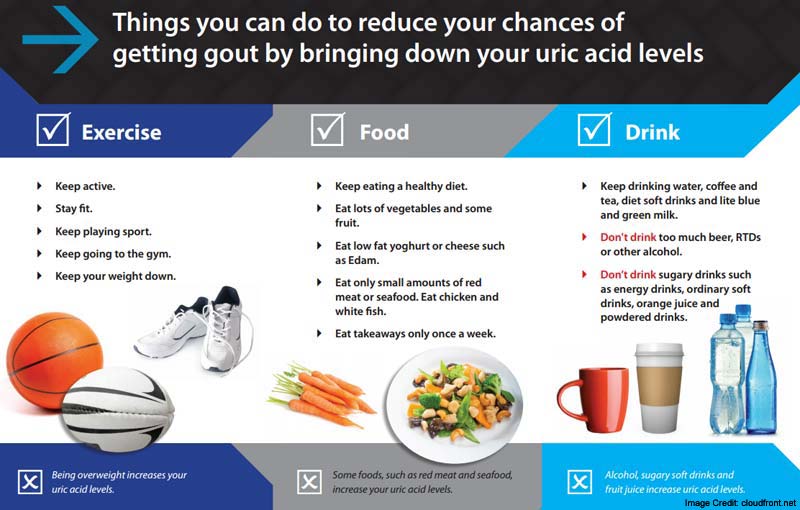What can you do to prevent and manage gout?
Gout, though not typically a life-threatening condition, is intimidating because it can be painful and have severe flare-ups from time to time. Fortunately, gout is a well-understood disease. As a result, medical experts know of several ways for gout prevention to manage this unpleasant condition.

Strategy 1: Understand the Disease
A form of arthritis, gout is a condition that can occur when uric acid has built up in the body in excess. The excess uric acid may join together to form crystals. These crystals, as they build up around a joint in the body, cause acute symptoms of arthritis around that joint. Symptoms typically include redness, inflammation, and pain in the region the crystals are formed in.
Typically, the first joint you might notice gout buildup around is the big toe. Other common joints that may be affected include the:
- Foot
- Ankle
- Knee
- Hand
- Wrist
- Elbow
Since gout is an acute form of arthritis, it tends to resolve itself within a few days or weeks. However, gout sometimes is not resolved by the body, especially if it is severe or caused in part by an enzyme deficiency. As a result, it is important for patients who suspect gout to visit their doctor.
A simple examination of medical history, fluid from the inflamed joint, and symptoms can lead to quick diagnosis and treatment. To prevent additional flare-ups of gout as much as possible, it is important to remember what causes gout?: the buildup of uric acid. Avoid that buildup.

Strategy 2: Avoid Foods High in Purine
Armed with the knowledge that gout is caused by the buildup of uric acid, if you want to prevent one of the best things you can do is avoid eating foods that contribute to the formation of uric acid. Purines are elements in foods that require uric acid to break them down. When the body recognizes purines have been consumed, it produced more uric acid to break them down. A research study published in the Nutrients Journal examine the correlation between the consumption of purine-rich foods in the diet and the mortality rate among Chinese adults.[1]
So, to keep the body from producing uric acid as much, it is helpful not to eat as many purines that will require the acid in the first place. You can’t completely avoid purines- they are found in your body tissues naturally. Likewise, uric acid itself is not bad for the body.
The important thing to do when avoiding purines to prevent gout is to maintain a balanced consumption of purines. For many people, that simply means avoiding the foods highest in purine levels, such as:
- Sweetbread
- Sardines
- Organ Meats
- Sea Foods
Apart from avoiding these foods, the best dietary support for preventing gout is simply eating a well-balanced, nutritious diet. A diet containing many fruits and vegetables, low in starches, and with healthy portions of lean meats is best.

Strategy 3: Know and Address Your Risk Factors
Your diet may not be a causal factor in your case of gout at all. For some people, gout is more of a hereditary issue or is more likely due to other risk factors. In such cases, a diet low in purines can help to prevent gout, but other preventative measures should be taken.
Although genetic makeup cannot be altered, there are other possible risk factors for gout. For instance, being overweight increases the likelihood of a person having flare-ups of gout. An overweight person with gout might prevent future flare-ups by losing weight. Likewise, drinking alcohol or coffee regularly can contribute to repeated flare-ups. Cease or manage these habits.
Another cause of uric acid build up can be certain medications. Diuretics or niacin, for example, can be a risk factor.[2] If you are on these medications and experience gout, talk to your doctor about other medicine options to prevent future flare-ups.
Strategy 4: Pay Attention to Known Triggers
For some people, gout seems to reoccur at certain times of the year or after particular events occur. If you recognize patterns like these, take the time to examine them. Compare your known triggers to the causes of gout.
If you usually experience gout in the summer, for instance, consider what you may be doing in the summer to contribute to the flare-ups. Do you get dehydrated more in the summer? A high fluid intake is essential for helping the body to prevent gout by flushing out uric acid. Do you eat more seafood in the summer? Certain types of seafood contribute to uric acid buildup. Take precautions accordingly.

Strategy 5: Stick With Your Medical Plan
Once you have been diagnosed with gout, you are at greater risk of having future flare-ups of gout. These uric acid crystals can build up over years of time and regularly waver on the brink of becoming large enough to cause pain and acute arthritis. A study published by Versus Arthritus suggested that uric acid crystals can form in the joints and remain there without causing any problems for a long time. However, if there are too many crystals, they can break free from the cartilage and enter the space between the bones, causing a sudden onset of pain and inflammation, known as acute arthritis.[3] As a result, gout management is very essential to avoid these flare-ups and you may consult your doctor on how to maintain the gout health.
Medical plans designed to treat and prevent gout sometimes involve preventative measures like those mentioned above. For example, many medical plans for addressing gout involve dietary changes, losing weight, drinking more water, and avoiding habits like regular coffee or alcohol consumption. However, medical plans may also include medication.
Common medications used [4] to treat and prevent gout include:
- NSAIDs
- Colchicine
- Corticosteroids
- Probenecid
- Zyloprim
- Uloric
- Aloprim
If your doctor suggests you begin taking one of these medications and prescribes one to you, stick to the plan. Even though you don’t experience symptoms of gout every day, you know from experience how painful the flare-ups can be. Medications like these help to prevent future flare-ups as much as possible. They can also make recovery from future flare-ups faster and easier.
Read Also
Conclusion
Don’t be fooled: once you have gout, you are at greater risk of future flare-ups. Use these strategies to prevent this acute arthritic condition to protect your joints and spare yourself unnecessary pain. Moreover, gout prevention is essential in making quicker recovery from flare-ups. You can also eliminate flare-ups using a joint pain supplement.
4 Sources
We review published medical research in respected scientific journals to arrive at our conclusions about a product or health topic. This ensures the highest standard of scientific accuracy.
[2] Gout: Causes, Symptoms and Treatment: https://www.livescience.com/34729-gout-causes-symptoms-treatment.html
[3] What is gout?: https://www.versusarthritis.org/about-arthritis/conditions/gout/
[4] Gout Treatment and Prevention: https://www.everydayhealth.com/gout/treatment-prevention/








 This article changed my life!
This article changed my life! This article was informative.
This article was informative. I have a medical question.
I have a medical question.
 This article contains incorrect information.
This article contains incorrect information. This article doesn’t have the information I’m looking for.
This article doesn’t have the information I’m looking for.